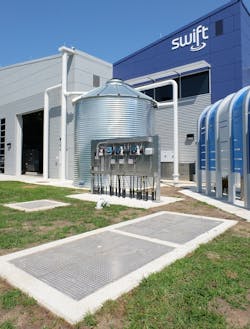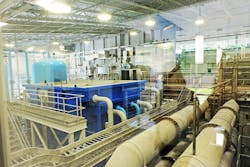An innovative water treatment program in Virginia called SWIFT (Sustainable Water Initiative for Tomorrow) is a critical first step designed to ensure a sustainable source of groundwater while addressing environmental challenges. The Hampton Roads Sanitation District (HRSD) is managing the project, which will take highly treated water and put it through additional rounds of advanced water treatment to meet drinking water quality standards. The SWIFT Water will then be added to the Potomac Aquifer, which will slow or even reverse the shrinking of land due to withdrawal, help restore the health of the Chesapeake Bay and give the region a sustainable source of groundwater.
A central part of the system are specialty access doors that stand before pumps and vaults that serve as the engine behind the complex system. The doors are an integral part toward protecting water and other matter from infiltrating the system, which could throw the entire project into disarray.
Marcor Associates, the BILCO sales representative in Virginia, worked with the Sanitation District to ensure that the proper access products were utilized for this project. BILCO Type JD-AL floor access doors were selected for the two underground pump stations to protect the vaults and provide reliable access to the underground pumps. The doors feature a channel frame design to prevent water and other liquids from entering the access openings and engineered lift assistance for easy, one-hand operation. The corrosion resistant aluminum doors were also supplied with Type 316 stainless steel hardware to stand up to this harsh water processing environment. BILCO LadderUP® ladder safety posts were also used throughout the system to ensure worker safety.
The SWIFT project could ultimately be a template for many areas of the country to follow to fight similar issues with wastewater and land subsidence. “SWIFT requires some geological features to be fully successful that are location specific — a confined thirsty aquifer being the primary requirement,’’ says Ted Henifin, General Manager of HRSD. “This is a great project, because 90 percent of what we currently discharge will no longer go into the Chesapeake Bay. It will be treated, purified and put into the ground where it can provide other benefits. But large-scale success with a carbon-based process, eliminating the need to deal with a waste brine stream, opens the possibility of recycling wastewater throughout the country.”
Editor's Note: Scranton Gillette Communications and the SGC Water Group are not liable for the accuracy, efficacy and validity of the claims made in this piece. The views expressed in this content do not reflect the position of the editorial teams of Water & Wastes Digest, Water Quality Products and Storm Water Solutions.

